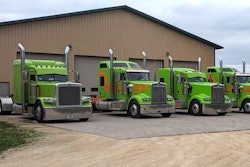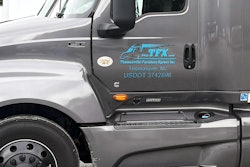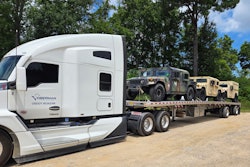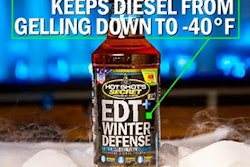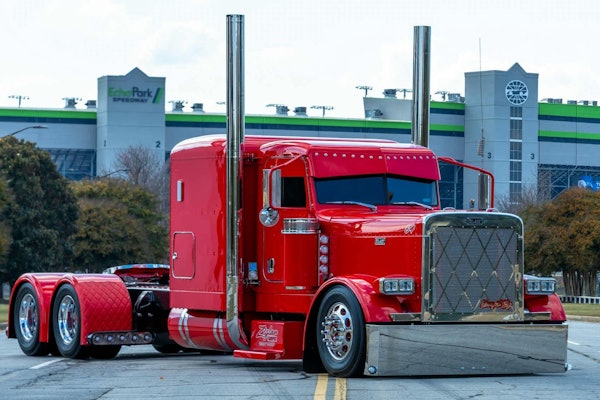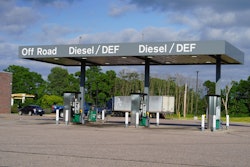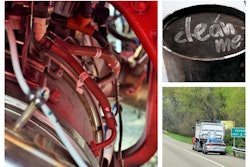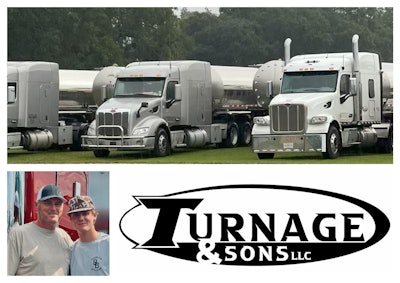
The father and son team at 29-truck Turnage & Sons LLC, Robbie and Levi Turnage, are fourth- and fifth-generation truckers, respectively.
Robbie’s great-grandfather hauled milk in cans back in the day, then his grandfather did the same thing and then became the first person in the Tylertown, Mississippi, area to get a tractor-trailer tanker combination to haul milk.
“I wish I could find that trailer,” Robbie Turnage said. “We used to call it a coffin. It was a single-axle trailer about 20 foot long, held 2,500 gallons of milk, and it looked like a coffin.” He noted that his step-father has an old 1967 Mack that they restored together, and he’s been hopeful to find the coffin to “get it redone and put it behind that old Mack.”
Following in his great-grandfather and grandfather’s footsteps, Robbie’s mother “was always in a milk truck” when he was coming up in school, “and I was usually with her on the weekends or during the summertime pulling hoses.”
He went from pulling hoses with his mother to doing mechanic work with his grandfather and step-dad. “We just pretty much grew up in it,” he said. “I’ve tried a lot of stuff, from box vans to flatbeds, step decks, hopper bottoms. But tankers, that’s my passion.”

The fifth generation of the family to start in the milk-hauling business, 19-year-old Levi Turnage, is following fast behind in his father's footsteps. He's been involved in the family business since he was in diapers, as regular readers may recall from Long Haul Paul Marhoefer’s story about father and son from the 2025 Mid-America Trucking Show.
[Related: Five generations of milk hauling: Turnage & Sons LLC]
“He used to ride in his car seat” in the truck, Robbie said of Levi’s start in the business. “The biggest deal was, me and my wife, I told her I didn’t want nobody else raising my kids. My grandma and grandpa pretty much raised me because my mama was working all the time. I told her I’d do what I had to do for her to stay home and raise” their children.
That came to fruition not long after Levi was born, but up until his mother finished her career as a special education teacher, Levi “rode around in the car seat in the passenger side of this truck with me going back and forth to Atlanta,” Turnage said.
Robbie said he “tried preaching to him to go to college” and get a “Monday through Friday job, play with big trucks on the weekends.” But “he’s just as stubborn as I am,” Robbie said. “He told me, ‘I got diesel and oil flowing through my veins just like you.’”
Robbie and his wife, Lori, along with Levi Turnage and the team they've assembled at Turnage & Sons, are semi-finalists in Overdrive's 2025 Small Fleet Championship, which will conclude October 23 at the National Association of Small Trucking Companies' annual conference.
Striking out on his own, to finding a sweet spot with organic milk
 Turnage's drivers take good care of his equipment, keeping it washed and staying on top of maintenance.
Turnage's drivers take good care of his equipment, keeping it washed and staying on top of maintenance.
Robbie Turnage started the Turnage & Sons LLC business in 2006 after having spent his whole life in and around the milk-hauling business of his forebears. He said it “used to be all conventional around the house. We had a lot of [milk] producers at one time, and I’ve grown up knowing all the producers I haul milk for now.”
Back in ’06, “the new niche came around called organic, and I was just getting started out on my own at this point in time. I was working with [Lone Star Milk Producers], and I was transporting out of West Texas and Kansas back and forth.”
 This is the last of several Small Fleet Champ semi-finalist profiles aired throughout the last month. (Access all of the published stories via this link.) Two finalists in each category (3-10 trucks, 11-30 trucks) will be announced Friday, October 3.
This is the last of several Small Fleet Champ semi-finalist profiles aired throughout the last month. (Access all of the published stories via this link.) Two finalists in each category (3-10 trucks, 11-30 trucks) will be announced Friday, October 3.
The nature of the business is they “mainly take care of the dairymen,” Turnage said. That sometimes involves getting a call at 2 or 3 o’clock in the morning to help if “anything’s wrong with a barn or something. … Trucking, and especially dealing with milk, is 24 hours a day.”
[Related: Derrick Wolfe has built a 'sweet' business in New York's Finger Lakes region]
Most of the Turnages' organic-milk customers are in Mississippi and Louisiana, the farthest being just 72 miles from the Turnage shop. They also continue to haul milk for Lone Star for dairies out of Georgia coming back to Mississippi and Louisiana.
Robbie's intimate knowledge of milk business fueled early growth after start-up to 12 trucks. At that point, he was working out of a 14'-by-30' building. His wife and business partner, Lori, pressured him into a deal: he wouldn't get any more trucks until she got space for an office -- to this day, Lori handles much of the business’s back-office work.
“I built her a 30'-by-50', two-story office and we ended up putting a 20-foot front porch off of it where we can park our vehicles under it,” he said. “Then I got the bright idea, for some stupid reason. I said, ‘You know what, I’m gonna go to 50 trucks.’"
When it got to 40, though, he knew he'd made a mistake.
“I can’t handle 40 trucks,” he told Lori. Levi was in junior high school by then, also helping work on the trucks when he could, changing tires, other shop work. “I just can’t dispatch, I can’t work on them, I can’t drive them, I can’t do all the stuff that I’m doing," Robbie said. "I literally liked to went crazy.”
He pulled back, downsizing to 25 power units, then brought his brother-in-law into the business full time. They made a deal that Turnage would buy a couple more trucks and give his brother-in-law a percentage for dispatching them. With that addition, today the fleet's stable -- at just around 28-30 trucks serving dairymen like Ron Pope of Pope Brothers Dairy of Franklinton, Louisiana.
Pope said Turnage has pulled his dairy's milk for more than 20 years and "will get it there rain, sleet, snow or shine. ... He's seven days a week. A lot of [truck drivers] can park and pull in and stop, but he can't. He's hauling milk, and that's a tough business."
Most of the milk coming out of Mississippi and Louisiana moves out to the Publix warehouse in Dacula, Georgia, with some going as far west as Dallas, Texas, and east to Lakeland, Florida.
During peak season for dairy farms (January-February), when producers are putting out more milk than their normal customer locations can handle, the Turnage & Sons' current 29 operating trucks and drivers extend the typical operating radius to Missouri, New York, Virginia, Tennessee and other places.
Turnage & Sons keeps two additional power units as spares in case one goes down for needed repairs. “I’m happy," Robbie said. "No more trucks. I told Levi when he takes over if he gets a wild hair, 'I got your back,'” but with the amount of space and employees to work on the trucks, “we are maxed out on what we need to do. 'If you want to start getting more trucks, you’re going to have to hire outside help to come in the shop.'"
[Related: Small Fleet Champ Larry Limp and team take do-it-yourself maintenance to new levels]
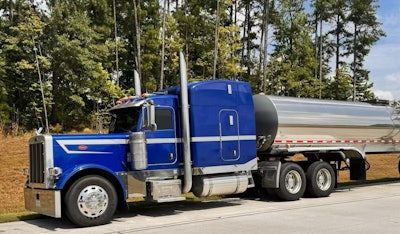
Managing equipment, tackling maintenance, with indispensable driver assist
All of the Turnage fleet's trucks are company-owned units. The entire fleet is Peterbilts, with four 567s, four 579s, three 389s and the rest older-model 379s. “We stay on top of our stuff” maintenance-wise, Robbie Turnage said, high-touch with so many older units.
 Robbie Turnage recently put a huge amount of work in this 1998 Peterbilt 379, "Twisted Tea." It's one of a handful of units in the fleet that are custom-built, show-quality power.
Robbie Turnage recently put a huge amount of work in this 1998 Peterbilt 379, "Twisted Tea." It's one of a handful of units in the fleet that are custom-built, show-quality power.
He depends on his drivers to alert him if something needs attention or just doesn't sound right. “It’s a whole lot cheaper for me to fix it" right then and there, he said, before the problem has opportunity to compound. Make necessary adjustments at the first sign of trouble and it might cost him "two, three, four, five hundred dollars, as opposed to keep running until it breaks and it costs me, you know, three-to-four thousand on the side of the road.”
Every truck is scheduled into the shop at 15,000 miles for service. When they do brakes, they change the drums instead of running two or three sets of brakes through them. Roughly 95% of the fleet’s maintenance is done in-house, Robbie Turnage said. If the shop is extra busy, they will use an outside shop “to kind of help us catch up. ... Some days we might have five trucks come through the shop, and it gets us a little swamped, especially on this new stuff.”
For that new stuff, Turnage's made the necessary investment in software -- such as Paccar’s Davie Diagnostic Software -- allowing for in-house fault code diagnosis to address issues. “You can go on their website and you can punch in a code -- it’ll tell you the troubleshooting with wires to check. It’s nice,” he said, once you get the hang of how the system works.
For all the maintenance support delivered with eagle eyes and ears OTR, in addition to all they do to truly drive the Turnage & Sons business, company drivers there bring home 98 cents a loaded mile during their first year. After they’ve been with him for a year with no accidents, they get bumped up to $1/mile. More-local drivers who pick up the organic milk make $100 per route pick, plus the mileage from the last barn location to their destination.
[Related: 'Light it up': Restored '90s W9, million-mile Pete 389 keep milk-haul fleet rolling]
 The National Association of Small Trucking Companies sponsors the Small Fleet Championship. Finalists receive a year's worth of membership in the association, with access to a myriad of benefits from NASTC's well-known fuel program to drug and alcohol testing services and much more. All will be recognized at the association's annual conference, where the winners will be announced October 23 in Nashville, Tennessee. Find more about the association via their website.
The National Association of Small Trucking Companies sponsors the Small Fleet Championship. Finalists receive a year's worth of membership in the association, with access to a myriad of benefits from NASTC's well-known fuel program to drug and alcohol testing services and much more. All will be recognized at the association's annual conference, where the winners will be announced October 23 in Nashville, Tennessee. Find more about the association via their website.
Robbie Turnage plans to turn the business over to Levi in the next five or six years. When that happens, he suspects Levi will "figure out how to do the 401(k)" with company matching and the like in addition medical benefits drivers are already afforded. Turnage pays $100 every two weeks toward coverage for drivers who get their insurance through the fleet. It ends up being nearly half of the $450 average premium per driver per month, Robbie said.
The fleet also offers Aflac supplemental insurance to cover cases of operators hurt on the job, to ensure paychecks are covered if they’re out of work. That usually runs about $140 a month, and Turnage covers $100 towards it.
Perhaps most importantly given the importance of family for the five-generation milk haulers, the company also makes sure drivers can be there when their families need them. Robbie gave an example: the time one of his drivers’ daughters broke her arm, and the father was 2.5 hours from home.
“I hopped in the truck and I went north. He headed south,” Robbie said. They met in the middle, Turnage finished the load, and the driver got to be with his daughter. “He stayed with her for a week and he never missed a paycheck.”
Turnage & Sons is known for stepping up in other ways, too. Beyond just excellence and commitment in business, Pope Brothers' Ron Pope has it firsthand.
Pope told the story of a hurricane hitting the Lake Charles, Louisiana, area. He and Robbie Turnage put some money together to buy a water pump and haul water into the impacted area so that people trapped in their homes would have water to flush toilets and wash their hands.
"He didn't want a nickel for it," Pope said of Turnage. "I think that speaks to where he's at," as not just a small business owner, but a human being.
[Related: Meet Overdrive's 2025 Small Fleet Champ semi-finalists]

